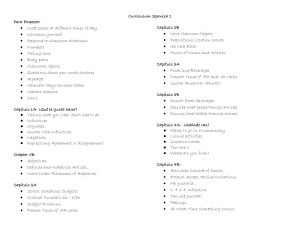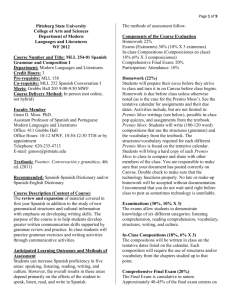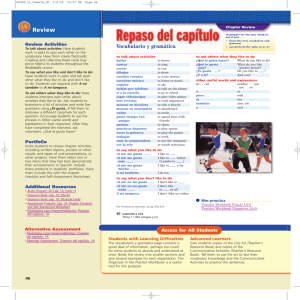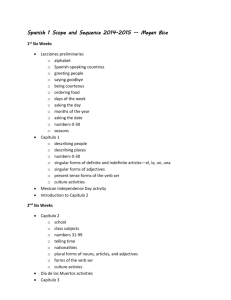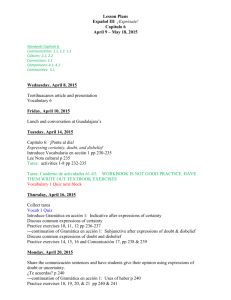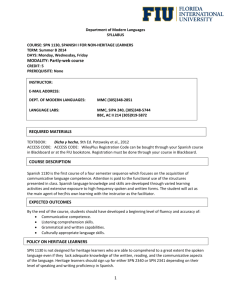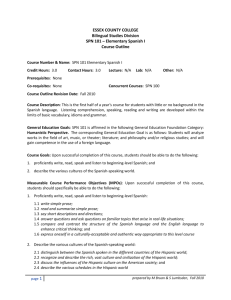Pittsburg State University College of Arts and Sciences Department
advertisement
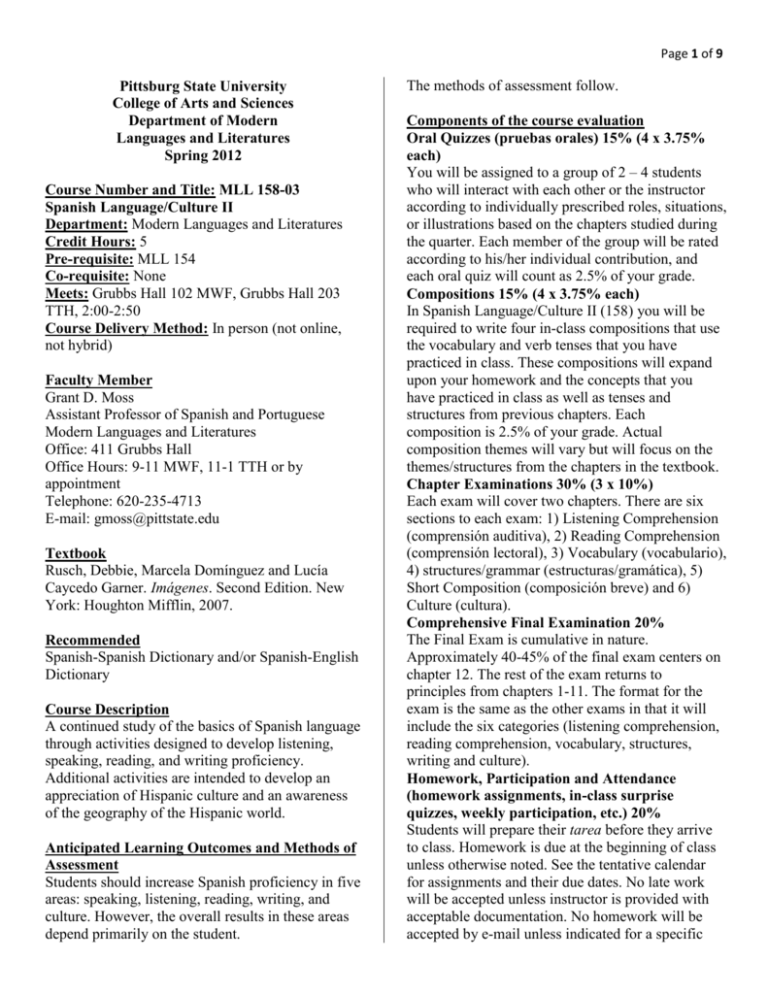
Page 1 of 9 Pittsburg State University College of Arts and Sciences Department of Modern Languages and Literatures Spring 2012 Course Number and Title: MLL 158-03 Spanish Language/Culture II Department: Modern Languages and Literatures Credit Hours: 5 Pre-requisite: MLL 154 Co-requisite: None Meets: Grubbs Hall 102 MWF, Grubbs Hall 203 TTH, 2:00-2:50 Course Delivery Method: In person (not online, not hybrid) Faculty Member Grant D. Moss Assistant Professor of Spanish and Portuguese Modern Languages and Literatures Office: 411 Grubbs Hall Office Hours: 9-11 MWF, 11-1 TTH or by appointment Telephone: 620-235-4713 E-mail: gmoss@pittstate.edu Textbook Rusch, Debbie, Marcela Domínguez and Lucía Caycedo Garner. Imágenes. Second Edition. New York: Houghton Mifflin, 2007. Recommended Spanish-Spanish Dictionary and/or Spanish-English Dictionary Course Description A continued study of the basics of Spanish language through activities designed to develop listening, speaking, reading, and writing proficiency. Additional activities are intended to develop an appreciation of Hispanic culture and an awareness of the geography of the Hispanic world. Anticipated Learning Outcomes and Methods of Assessment Students should increase Spanish proficiency in five areas: speaking, listening, reading, writing, and culture. However, the overall results in these areas depend primarily on the student. The methods of assessment follow. Components of the course evaluation Oral Quizzes (pruebas orales) 15% (4 x 3.75% each) You will be assigned to a group of 2 – 4 students who will interact with each other or the instructor according to individually prescribed roles, situations, or illustrations based on the chapters studied during the quarter. Each member of the group will be rated according to his/her individual contribution, and each oral quiz will count as 2.5% of your grade. Compositions 15% (4 x 3.75% each) In Spanish Language/Culture II (158) you will be required to write four in-class compositions that use the vocabulary and verb tenses that you have practiced in class. These compositions will expand upon your homework and the concepts that you have practiced in class as well as tenses and structures from previous chapters. Each composition is 2.5% of your grade. Actual composition themes will vary but will focus on the themes/structures from the chapters in the textbook. Chapter Examinations 30% (3 x 10%) Each exam will cover two chapters. There are six sections to each exam: 1) Listening Comprehension (comprensión auditiva), 2) Reading Comprehension (comprensión lectoral), 3) Vocabulary (vocabulario), 4) structures/grammar (estructuras/gramática), 5) Short Composition (composición breve) and 6) Culture (cultura). Comprehensive Final Examination 20% The Final Exam is cumulative in nature. Approximately 40-45% of the final exam centers on chapter 12. The rest of the exam returns to principles from chapters 1-11. The format for the exam is the same as the other exams in that it will include the six categories (listening comprehension, reading comprehension, vocabulary, structures, writing and culture). Homework, Participation and Attendance (homework assignments, in-class surprise quizzes, weekly participation, etc.) 20% Students will prepare their tarea before they arrive to class. Homework is due at the beginning of class unless otherwise noted. See the tentative calendar for assignments and their due dates. No late work will be accepted unless instructor is provided with acceptable documentation. No homework will be accepted by e-mail unless indicated for a specific Page 2 of 9 assignment. You will also receive a weekly participation grade. See Class Attendance and Participation Policy below for more information. Class Attendance and Participation Policy This class includes numerous activities that require you to engage, explore, explain, elaborate, and evaluate. You are expected to be involved and stay involved. Each meeting will add some new dimension to your knowledge of the language and its related cultures. Regular attendance and participation in class activities are essential to be a successful language learner. You must prepare carefully for class, complete all assignments in advance and participate in class. Every day you will receive a grade for individual, pair, and/or group activities. In-class participation en español is important for your success in this class. Come ready to talk about the text for that day! Every day that you do not attend will affect your participation grade because you are not in class to participate! If you do miss a class, makeup work will be permitted only when the instructor is presented with acceptable documentation. Legitimate excused absences include the following: participation in a scheduled activity of an official University organization, verifiable confining illness, serious verifiable family emergencies, subpoenas, jury duty, and military service. It is your responsibility to notify your instructor of any excused absence as far in advance as possible. Makeup work must be made up in a timely manner (e.g. before the next scheduled evaluation). Documentation for excused absences must be presented as soon as possible. No documentation (and by extension no makeup work) will be accepted after the last day of regularly scheduled classes. After four absences, each additional undocumented absence will result in a one (1) point reduction of your final grade per absence, i.e., two (2) unexcused absences (beyond the four “grace” days) will reduce your final grade by two (2) points. For example if your overall average is 91% and you have six unexcused absences your final grade will be 89%. Absences are counted from the first day of the quarter. Chronic lateness to class will also reduce your grade. Three tardies equal one absence. The instructor will not drop students from this course for nonattendance or excessive absences. If you do not attend class or have excessive absences you should consider withdrawal from the course or should consult with the various offices on campus. Grading Scale A = 90-100% B = 80-89% C = 70-79% D = 60-69% F = 0-59% E-mail policy The instructor will communicate with you through Pittsburg State e-mail and/or Angel. You must check your Pitt State e-mail/Angel frequently for updates from the instructor. The instructor will check his e-mail at least once daily during regular business hours (from Monday to Friday) and he will usually respond to any e-mail inquiries within 24 hours. If you have questions about what the homework is, you should ask a classmate or check the calendar just in case our e-mail checks do not coincide! Remember that no assignment will be accepted through e-mail unless otherwise indicated. Study Abroad! The department strongly recommends that all Modern Languages and Literatures majors and minors participate in accredited study abroad programs. PSU offers study abroad scholarships as well as assistance with other financial aid. To learn about accredited programs, contact Megan Corrigan, Study Abroad Coordinator, at 235-4221 or visit 118C Whitesitt Hall. For information on transfer credits, consult with Judy Berry-Bravo, Chair of Modern Languages and Literatures, at 235-4708 or visit 429 Grubbs Hall. Student Conduct Code According to the Student Conduct Code, “Disruption of classes, seminars, research projects, activities or operations of the University” (http://www.pittstate.edu/audiences/currentstudents/policies/rights-and-responsibilities/studentconduct-code.dot) will not be tolerated. This instructor does not permit the use of cell phones or other electronic devices in class unless otherwise indicated. Exceptions will be made for assistive technologies for the vision-or hearing-impaired in consultation with the Center for Student Accommodations. Page 3 of 9 Center for Student Accommodations If you feel that you may need an accommodation based on the impact of a disability, you should contact your instructor privately to discuss your specific needs. Students with disabilities that have been certified by the Center for Student Accommodations will be appropriately accommodated, and should inform the instructor as soon as possible of their needs. The Center for Student Accommodations is located in the Bryant Student Health Center, telephone 620-235-4309. Retro-credits The Department of Modern Languages and Literatures has a retro-credits program designed to reward students who have already spent years learning languages in high school. Students must sign up for the program in 428 Grubbs Hall with Kathy Dyer, Departmental Secretary, during the first three weeks of the semester in which they take their first language course at PSU. That course determines their entry level and the maximum credits they can earn through retro-credits. For more information on retro-credits visit our webpage at www.pittstate.edu/flang. Transfer students who took language courses at another university or college are not eligible. The Department encourages students to seek faculty advice to determine their best entry level. Linguafolio Linguafolio is an assessment tool that encourages students to recognize and record their proficiency level at various times during their study of a foreign language. The program encourages each student to create a personal checklist; this list helps the student to focus on the skills that he/she must develop in order to achieve a higher level of proficiency. If used appropriately, this tool can increase a student’s ability to identify his/her strengths and weaknesses in the language in order to improve. For more information see your instructor or the Angel page for our course. ACTFL (American Council on the Teaching of Foreign Languages) 2012 Proficiency Guidelines Speaking Writing, Listening and Reading http://www.actfl.org/files/public/ACTFLProficiency Guidelines2012_FINAL.pdf Spanish Table Mondays 12:00-1:00 at Gorilla Crossing Other important Pittsburg State information See the end of this syllabus (after the tentative calendar) for other pertinent information or visit http://www.pittstate.edu/office/registrar/forms.dot. Tentative Course Calendar Semana 1 16 de enero MARTIN LUTHER KING DAY! 17 de enero Introduction to course Tarea: Estudiar Capítulo Preliminar y Capítulo 1 (pp. 1-36); Estudiar el guión de curso (syllabus) en Angel. 18 de enero En clase: Repaso Capítulo Preliminar y Capítulo 1 Tarea: Estudiar Capítulo 2 (pp. 37-66); Escribir Actividad 13 partes A, B, C (p. 45) 19 de enero En clase: Entregar Actividad 13 partes A, B, C (p. 45); Repaso Capítulo 2 Tarea: Estudiar Capítulo 3 (pp. 67-93); Escribir Actividad 12 (p. 75) y Actividad 18 (p. 77) 20 de enero En clase: Repaso Capítulo 3 Tarea: Estudiar Capítulo 4 (pp. 94-122); Escribir Actividad 9 (p. 99) Semana 2 23 de enero En clase: Entregar Actividad 12 (p. 75) y Actividad 18 (p. 77); Repaso Capítulo 4 Tarea: Estudiar Capítulo 5 (pp. 123-150); Escribir Actividad 7 (p. 127; usa oraciones completas) y Actividad 9 (p. 130). 24 de enero En clase: Entregar Actividad 7 (p. 127; usa oraciones completas) y Actividad 9 (p. 130); Repaso Capítulo 5 Tarea: Estudiar Capítulo 6 (pp. 151-183); Escribir Actividad 11 (p. 160) Page 4 of 9 25 de enero En clase: Entregar Actividad 11 (p. 160); Repaso Capítulo 6 Tarea: Estudiar Capítulo 6 (pp. 151-183); Escribir Actividad 35 (p. 175). 26 de enero En clase: Entregar Actividad 35 (p. 175); Capítulo 6 Tarea: Estudiar Capítulo 7 (pp. 184-191) 27 de enero Composición 1/Prueba oral 1 (Capítulos 1-6) Semana 3 30 de enero En clase: Capítulo 7 (pp. 184-191) Tarea: Estudiar pp. 191-196; Escribir Actividad 8 (p. 190) y Actividad 10A (p. 193) 31 de enero En clase: Entregar Actividad 8 (p. 190) y Actividad 10A (p. 193); Capítulo 7 pp. 191-196 Tarea: Estudiar pp. 196-198; Escribir Actividad 16 (p. 197) 1 de febrero En clase: Capítulo 7 pp. 196-198 Tarea: Estudiar pp. 199-202 Nuevos Horizontes; Escribir Actividad 23A (p. 202) 2 de febrero En clase: Capítulo 7 pp. 199-202 Nuevos Horizontes, pp. 203-205 Tarea: Estudiar pp. 199-205; Escribir Actividad 23A (p. 202) 3 de febrero En clase: Entregar Actividad 23A (p. 202); Capítulo 7 pp. 203-208 Tarea: Estudiar pp. 206-208 Semana 4 6 de febrero En clase: Capítulo 7 pp. 207-208 Tarea: Estudiar pp. 207-208; Escribir Actividad 32A (p. 207) A y B 7 de febrero En clase: Entregar Actividad 32A (p. 207) A y B; Capítulo 7 pp. 208-212 Tarea: Estudiar pp. 208-212, Escribir Actividad 37 A y B (p. 211) 8 de febrero En clase: Entregar Actividad 37 A y B (p. 211); Capítulo 7 pp. 208-212 Tarea: Estudiar para el examen I 9 de febrero En clase: Repaso para el examen I Tarea: Estudiar para el examen I 10 de febrero Examen I (Capítulo 1-7) Semana 5 13 de febrero En clase: Capítulo 8 Tarea: Estudiar pp. 214-221 14 de febrero En clase: Capítulo 8 pp. 214-221 Tarea: Estudiar pp. 219-221; Escribir Actividad 8 (p. 220) y usa oraciones completas. 15 de febrero En clase: Entregar Actividad 8 (p. 220); Capítulo 8 pp. 221-225 Tarea: Estudiar pp. 221-225; Escribir Actividad 13 (p. 222) 16 de febrero En clase: Entregar Actividad 13 (p. 222); Capítulo 8 pp. 226-228 Tarea: Estudiar pp. 226-228 Nuevos Horizontes; Escribir Actividad 23A (p. 228) 17 de febrero En clase: Entregar Actividad 23A (p. 228); Capítulo 8 pp. 229-231 Tarea: Estudiar pp. 229-231; Escribir Actividad 24 (p. 230). Semana 6 20 de febrero En clase: Entregar Actividad 24 (p. 230); Capítulo 8 pp. 231-237 Page 5 of 9 Tarea: Estudiar pp. 231-237; Escribir Actividad 35A (p. 235) usa oraciones completas (sólo tú) 21 de febrero En clase: Entregar Actividad 35A (p. 235); Capítulo 8 pp. 231-237 Tarea: Estudiar pp. 231-237 22 de febrero En clase: Capítulo 8 pp. 231-237 Tarea: Estudiar pp. 238-241 23 de febrero En clase: Capítulo 8 pp. 238-241 Tarea: Estudiar para la composición 2/Prueba oral 2 24 de febrero Composición 2/Prueba oral 2 (Capítulo 8) Semana 7 27 de febrero En clase: Capítulo 9 pp. 242-246 Tarea: Estudiar pp. 242-246; Escribir Actividad 5 (p. 246) 28 de febrero En clase: Entregar Actividad 5 (p. 246); Capítulo 9 pp. 247-248 Tarea: Estudiar pp. 247-248; Escribir Actividad 9 (p. 248) 29 de febrero En clase: Entregar Actividad 9 (p. 248); Capítulo 9 pp. 248-252 Tarea: Estudiar pp. 248-252; Escribir Actividad 13 (p. 251) 1 de marzo En clase: Entregar Actividad 13 (p. 251); Capítulo 9 pp. 253-255 Tarea: Estudiar pp. 253-255; Escribir Actividad 18 (p. 254) 2 de marzo En clase: Entregar Actividad 18 (p. 254); Capítulo 9 pp. 256-258 Tarea: Estudiar pp. 256-258 Nuevos Horizontes; Escribir Actividad 27 A y B (p. 258) Semana 8 5 de marzo En clase: Actividad 27 A y B (p. 258); Capítulo 9 pp. 256-258 Nuevos Horizontes, pp. 259-260 Tarea: Estudiar pp. 259-260; Escribir Actividad 29 (p. 260) 6 de marzo En clase: Entregar Actividad 29 (p. 260); Capítulo 9 pp. 261-269 Tarea: Estudiar pp. 261-269 7 de marzo En clase: Capítulo 9 pp. 261-269 Tarea: Estudiar para el examen II 8 de marzo En clase: Repaso para el examen II (Capítulos 8 y 9) Tarea: Estudiar para el examen II 9 de marzo En clase: Examen II (Capítulos 8 y 9) Tarea: Estudiar Capítulo 10 Semana 9 12 de marzo En clase: Capítulo 10 pp. 271-275 Tarea: Estudiar pp. 271-275; Escribir Actividad 5 (p. 275) 13 de marzo En clase: Entregar Actividad 5 (p. 275); Capítulo 10 pp. 276-277 Tarea: Estudiar pp. 276-277; Escribir Actividad 6 (p. 276) 14 de marzo En clase: Entregar Actividad 6 (p. 276); Capítulo 10 pp. 277-278 Tarea: Estudiar pp. 277-278 15 de marzo En clase: Capítulo 10 pp. 279-283 Tarea: Estudiar pp. 279-283; Estudiar para la composición 3/Prueba oral 3 16 de marzo Composición 3/Prueba oral 3 (Capítulo 10) Tarea: Estudiar pp. 279-283; Escribir Actividad 15 (p. 282) Page 6 of 9 Descanso de Primavera (19-23 de marzo) Semana 10 26 de marzo En clase: Entregar Actividad 15 (p. 282); Capítulo 10 pp. 284-288 Tarea: Estudiar pp. 284-288 Nuevos Horizontes; Escribir Actividad 21 A y B (p. 288) 27 de marzo En clase: Entregar Actividad 21 A y B (p. 288); Capítulo 10 pp. 289-291 Nuevos Horizontes Tarea: Estudiar pp. 289-291; Escribir Actividad 22 y Actividad 25 (p. 290) 28 de marzo En clase: Entregar Actividad 22 y Actividad 25 (p. 290); Capítulo 10 pp. 289-292 Tarea: Estudiar Capítulo 10 pp. 289-292 5 de abril En clase: Entregar Actividad 14 (p. 312); Capítulo 11 pp. 313-316 Tarea: Estudiar pp. 313-316 Nuevos Horizontes, Escribir Actividad 18 A y B (p. 316) 6 de abril En clase: Capítulo 11 pp. 313-316 Nuevos Horizontes/pp. 317-321 Tarea: Estudiar pp. 317-321; Escribir Actividad 19 (p. 318) Semana 12 9 de abril En clase: Entregar Actividad 19 (p. 318); Capítulo 11 pp. 321-330 Tarea: Estudiar pp. 321-330; Escribir Actividad 22 (p. 319) 29 de marzo En clase: Capítulo 10 pp. 293-301 Tarea: Estudiar pp. 293-301; Escribir Actividad 33 y Actividad 34 (p. 296) 10 de abril En clase: Entregar Actividad 22 (p. 319); Capítulo 11 pp. 321-330 Tarea: Estudiar Capítulo 11 pp. 321-330; Escribir Actividad 27 (p. 323), Actividad 30 (p. 325) y Actividad 36 (p. 328) 30 de marzo En clase: Entregar Actividad 33 y Actividad 34 (p. 296); Capítulo 10 pp. 293-301; Tarea: Escribir Actividad 36 (p. 297) 11 de abril En clase: Entregar Actividad 27 (p. 323), Actividad 30 (p. 325) y Actividad 36 (p. 328); Tarea: Estudiar para el examen III Semana 11 2 de abril En clase: Entregar Actividad 36 (p. 297) Capítulo 10 Videoimágenes/Capítulo 11 pp. 302-306 Tarea: Estudiar pp. 302-306; Escribir Actividad 3A (p. 304) 12 de abril En clase: Repaso para el examen III Tarea: Estudiar para el examen III 3 de abril En clase: Entregar Actividad 3A (p. 304); Capítulo 11 pp. 307-311 Tarea: Estudiar pp. 307-311; Escribir Actividad 8 (p. 308) Semana 13 16 de abril En clase: Capítulo 12 pp. 332-336 Tarea: Estudiar pp. 332-336; Escribir Actividad 5 (p. 336) 4 de abril En clase: Entregar Actividad 8 (p. 308); Capítulo 11 pp. 311-312 Tarea: Estudiar pp. 311-312; Escribir Actividad 14 (p. 312) 17 de abril En clase: Entregar Actividad 5 (p. 336); Capítulo 12 pp. 337-340 Tarea: Estudiar pp. 337-340; Escribir Actividad 10 (p. 338) 13 de abril Examen III (Capítulos 10 y 11) Page 7 of 9 18 de abril En clase: Entregar Actividad 10 (p. 338); Capítulo 12 pp. 340-342 Tarea: Estudiar pp. 340-342; Escribir Actividad 17 y Actividad 18 (p. 341) 19 de abril En clase: Entregar Actividad 17 y Actividad 18 (p. 341); Capítulo 12 pp. 343-345 Tarea: Estudiar pp. 343-345 Nuevos Horizontes; Escribir Actividad 25 A y B (p. 345) 20 de abril En clase: Entregar Actividad 25 A y B (p. 345); Capítulo 12 pp. 343-345 Nuevos Horizontes/346349 Tarea: Estudiar pp. 346-349; Escribe Actividad 26 (p. 346) Semana 14 23 de abril En clase: Entregar Actividad 26 (p. 346); Capítulo 12 pp. 349-350 Tarea: Estudiar pp. 349-350; Escribir Actividad 32 (p. 350) 24 de abril En clase: Entregar Actividad 32 (p. 350); Capítulo 12 pp. 351-355 Tarea: Estudiar pp. 351-355; Escribir Actividad 37 (p. 352) 25 de abril En clase: Entregar Actividad 37 (p. 352); Capítulo 12 pp. 356-357 Tarea: Estudiar pp. 356-357; Escribir Actividad 1 (p. 356) 26 de abril En clase: Entregar Actividad 1 (p. 356); Capítulo 12 pp. 356-357 Tarea: Estudiar para la composición 4/Prueba oral 4) 27 de abril Composición 4/Prueba oral 4 (Capítulo 12) Semana 15 30 de abril En clase: Temas suplementarios 358-360, 364-365 Tarea: Estudiar pp. 364-365 el futuro; Escribir Actividad 10 (p. 365) 1 de mayo En clase: Entregar Actividad 1 (p. 365); Temas suplementarios pp. 367-368 el condicional Tarea: Estudiar pp. 367-368 el condicional; Escribir Actividad 15 (p. 368) 2 de mayo En clase: Entregar Actividad 15 (p.368) Temas suplementarios pp. 367-368 el condicional Tarea: Estudiar pp. 364-365, 367-368 3 de mayo En clase: Capítulo 12 pp. 364-365, 367-368 Tarea: Estudiar para el examen final 4 de mayo Repaso para el examen final Tarea: Estudiar para el examen final Semana 16 Semana de exámenes finales (del 7 al 11 de mayo) Examen final: el 9 de mayo de 2012 (miércoles) 2:00-4:50 Grubbs Hall 203 Other important Pittsburg State information IMPORTANT DATES 1/17 ..................................................................................Classes begin 1/24 .......................................................................................Tuition due 1/24…………………………Last day for full tuition refund if withdrawing 1/24 ……………… Last day to add classes w/o permission of instructor 1/30………………………………Final day to drop w/o transcript notation 2/20 .............................................Last day for half refund if withdrawing 3/12……………………Mid-term D and F grades available after 5:00 pm 3/19- 3/23 ...........................................................................Spring Break 4/9 ............Final day to drop a course unless withdrawing from all classes 4/26…………………………………Last day to withdraw from all classes 5/7 .....................................................................Finals week through 5/11 5/11 & 5/12 .....................................................................Commencement 5/11………………Deadline to remove IN grades for 2011 fall semester 5/14 ..................................................................Grades due from faculty DROPPING A COURSE OR WITHDRAWING FOR THE SEMESTER Beginning the 12th week through the 16th week of full-term courses, individual courses cannot be dropped. A student who does not officially withdraw from a course or from the university will be assigned an “F” grade in the course or courses concerned. These “F” grades will be included in the computation of the grade point average. The dates for dropping courses that run fewer than sixteen weeks are proportionate to the length of the course (e.g. the last day to drop an eight week course would be the end of the sixth week). Consult your instructor or the Registrar’s Office for questions about a specific course. For students who wish to withdraw from all classes after the 12th week of the term, the instructor must assign a grade of W or F. Page 8 of 9 To drop a course after the 5th day of class or for clarification on drop/add policies, contact the Registrar’s Office, 103 Russ Hall, 620-235-4200 or registrar@pittstate.edu IMPORTANT INFORMATION FOR STUDENTS RECEIVING FINANCIAL ASSISTANCE The Office of Student Financial Assistance is required to recalculate financial aid eligibility for students who withdraw, stop attending or are dismissed prior to completing 60 percent of a semester. This calculation applies to students receiving Title IV funds including: Federal Pell Grant Stafford Loan ACG – Academic Competitiveness Grant SMART Grant for math and science TEACH Grant for education majors Parent PLUS Loan paraphrasing other individuals’ ideas or concepts without acknowledging their work, or contribution. To avoid charges of plagiarism, students should follow the citation directions provided by the instructor and/or department in which the class is offered. The above guidelines do not preclude group study for exams, sharing of sources for research projects, or students discussing their ideas with other members of the class unless explicitly prohibited by the instructor. Since the violation of academic honesty strikes at the heart of the education process, it is subject to the severest sanctions, up to and including receiving an “F” or “XF” (an “XF” indicates that “F” was the result of academic dishonest) for the entire class and dismissal from the university. For a full copy of this policy see: http://catalog.pittstate.edu/contentm/blueprints/blueprint_display.php?bp_listi ng_id=162&blueprint_id=124&sid=1&menu_id=7980 MID-TERM GRADES Federal financial aid is returned to the federal government based on the percent of unearned aid disbursed toward institutional charges for tuition, fees, and on-campus room and board. Students may be required to repay a portion of the aid funds received. When aid is returned, the student may owe a debit balance to the University and/or Department of Education Title IV Programs. After the eighth week of the fall and spring semester, mid-semester “D” and “F” grades submitted by faculty are reported by the Office of the Registrar to the dean of the college in which you are majoring. All “D” and “F” grades submitted by faculty will be reported by the Registrar to you and your academic advisor through the on-line student information system (GUS). No mid-semester report of “D” and “F” grades are distributed for the summer session. IMPORTANT INFORMATION FOR INTERNATIONAL STUDENTS INCOMPLETE GRADES International students studying on F or J visas must be in proper immigration status and are required to always be in full time enrollment (minimum 12 hours undergraduate. or 9 hours graduate). For additional information http://www.pittstate.edu/office/international/internationalstudents/immigration.dot Incomplete grade may be assigned in rare instances when a student is unable to complete a course due to circumstances beyond his/her control. You must have completed a majority of the coursework to be eligible for this consideration. Unless granted an extension by the instructor, students have only one semester to complete the work. If you feel like you qualify for an Incomplete grade, you should visit with your instructor and not assume an IN grade will be assigned automatically. CLASS ATTENDANCE POLICY Students at Pittsburg State University are expected to attend class regularly and participate fully in class activities. It is the responsibility of the course instructor to set the attendance policy for his or her courses and communicate that policy to students in the course syllabus. The syllabus should address whether and how attendance affects the course grade, the issue of excused absences, and whether students will be dropped for nonattendance or excessive absence. Students who have not attended or who have been excessively absent from a class may be dropped from the course by the instructor. In such instances, this policy must be clearly stated in the syllabus and uniformly enforced. Students may be dropped at anytime in the semester based on course policy. Instructor drops after the beginning of the 12th week of a full semester class will result in a grade of “F” for the course. Regardless of the faculty prerogative to drop a student for nonattendance or excessive absence, the ultimate responsibility for monitoring and maintaining up-to-date course enrollment rests with the student. SEVERE WEATHER INFORMATION If forecasts or weather conditions suggest that travel in the area could become hazardous a policy is in place to determine if classes or other University activities will be cancelled. This policy and notification process can be found at http://www.pittstate.edu/office/president/policies/severe-weatheremergency-plan.dot Notification methods typically include the PSU website, local news media, and text messaging for those who subscribe to this service. ACADEMIC INTEGRITY POLICY Academic dishonesty by a student is defined as unethical activity associated with course work or grades. It includes, but is not limited to: (a) Giving or receiving unauthorized aid on examinations. (b) Giving or receiving unauthorized aid in the preparation of notebooks, themes, reports, papers or any other assignments. (c) Submitting the same work for more than one course without the instructor’s permission, and, (d) Plagiarism. Plagiarism is defined as using ideas or writings of another and claiming them as one’s own. Copying any material directly (be it the work of other students, professors, or colleagues) or copying information from print or electronic sources (including the internet) without explicitly acknowledging the true source of the material is plagiarism. Plagiarism also includes FINAL GRADE REPORTS Final grades are reported to the Registrar’s Office at the conclusion of the course. You may access your grades in GUS immediately upon grade posting. GRADE APPEALS Final course grades are to be awarded upon criteria communicated to the student at the beginning of the semester. Additional work after a final grade was submitted cannot be used to change the grade. If you believe that an error has been made in the assignment or recording of a final grade, you should first confer with the instructor. If such a conference does not resolve the problem, a grade appeal form must be submitted to the head of the academic department that offers the course in question. This appeal form must be submitted no later than six weeks after the beginning of the fall or spring semester immediately following the semester in which the grade being appealed was received. The appeal form is available online on the Registrar’s Office and Graduate School’s webpage under forms. DEAD WEEK POLICY No tests or major assignments will be presented during the week prior to final examination week, unless identified in the course syllabus presented at the start of the semester. FINAL EXAM SCHEDULE Final examinations will be given according to the schedule of examinations available at http://www.pittstate.edu/office/registrar/final-exam-schedule.dot FINAL EXAM OVERLOAD POLICY If you have three or more final exams officially scheduled for a single day you are entitled to arrange with the faculty member instructing the highest numbered course (the 3 digit number following the department code) a different day for the exam. If two courses have the same number, the course with the lower enrollment would be rescheduled. Students requesting accommodation should submit their request on the form found at http://www.pittstate.edu/office/registrar/forms.dot along with a copy of their class schedule, at least two weeks prior to the beginning of final exam week. The faculty member has until the Monday of pre-finals week to arrange Page 9 of 9 a mutually convenient time for administration of the final exam. If the matter cannot be resolved between student and faculty member, you may take the request to the Office of the Provost, 220 Russ Hall, no later than the Wednesday of dead week. University Counseling Services Telephone: 620-235-4452 http://www.pittstate.edu/office/counseling/ General Questions WHERE TO GO FOR ASSISTANCE Pittsburg State administration, faculty, and staff are here to assist you in your academic success. If you have questions or concerns that affect your academic success, it is important that we hear from you. Your Instructor Faculty members usually include their office hours and contact information in the class syllabus. If not, set a time to meet with your instructor by speaking with him/her prior to or immediately following your class session or check with the departmental office for instructor availability. Writing Assistance The Writing Center offers free writing consultations for students at any stage of the writing process for any writing project. Writing Center consultants are experienced writers who are committed to helping you achieve your writing goals. Dr. Don Judd and Dr. Janet Zepernick, Directors, Writing Center Telephone: 620-235-4694 http://www.pittstate.edu/office/writing_center/ Library The Axe Library provides comprehensive services and materials including both physical and online books, periodicals, and interlibrary loan. Also available to students are a computer lab, with color printing, scanning and faxing capabilities. Spring semester operating hours are: Telephone: 620-235-4880 http://axe.pittstate.edu/ Tutoring Tutoring programs related to general education classes are available. Whether you are studying for a test, writing a paper or preparing a presentation, tutors can help you sharpen your skills and increase your knowledge. If you are struggling with a class, then a tutor can help you get back on track. Use tutoring to get better grades! Rebecca Roach, Student Success Counselor, Student Success Center Telephone: 620-235-4951 E-mail: AskRebecca@pittstate.edu http://www.pittstate.edu/office/exploratory-studies/tutoring.dot. Computer/Technology Assistance Gorilla Geeks Help Desk is responsible for assisting students with various technology needs. Services available include help with GUS and GusPINs, PSU email, assistance with campus system problems and support of the campus wireless network. In addition the center will help you with technology needs that are essential for academic success. Services include assistance with educational software packages used on campus including Microsoft OS, Office applications, basic ANGEL support and other campus applications; help with computer hardware or software problems; wireless connectivity; and configuring new computers. Gorilla Geeks Help Desk Telephone: 620-235-4600 E-mail: Geeks@pittstate.edu http://www.pittstate.edu/office/gorilla-geeks/ Services for Students with Learning Disabilities Allison Adams, Coordinator, Center for Student Accommodations Telephone: 620-235-6584 http://www.pittstate.edu/office/counseling/center-for-studentaccommodations.dot Services for Students with Physical Disabilities Cindy Johnson, Director, Equal Opportunity/ Affirmative Action Telephone: 620-235-4189 http://www.pittstate.edu/office/eoaa/ Student Health Center Telephone: 620-235-4452 http://www.pittstate.edu/office/health/ If you have questions about university policies or procedures, need assistance with academic success skills (such as note taking, effective reading techniques, and test taking strategies), or have general questions about your academic progress, Enrollment Management & Student Success can assist or refer you to the appropriate office. Enrollment Management & Student Success Telephone: 620-235-4109 STATEMENT OF NONDISCRIMATION Pittsburg State University is committed to a policy of educational equity. Accordingly, the University admits students, grants, financial aid and scholarships, conducts all educational programs, activities, and employment practices without regard to race, color, religion, sex, national origin, sexual orientation, age, marital status, ancestry or disabilities. Students seeking assistance with academic programs because of physical limitations are to contact the Director of Equal Opportunity. Students with learning disabilities should contact the Coordinator of the Center for Student Accommodations. If you are hearing-impaired, call 1-800-766-3777.
